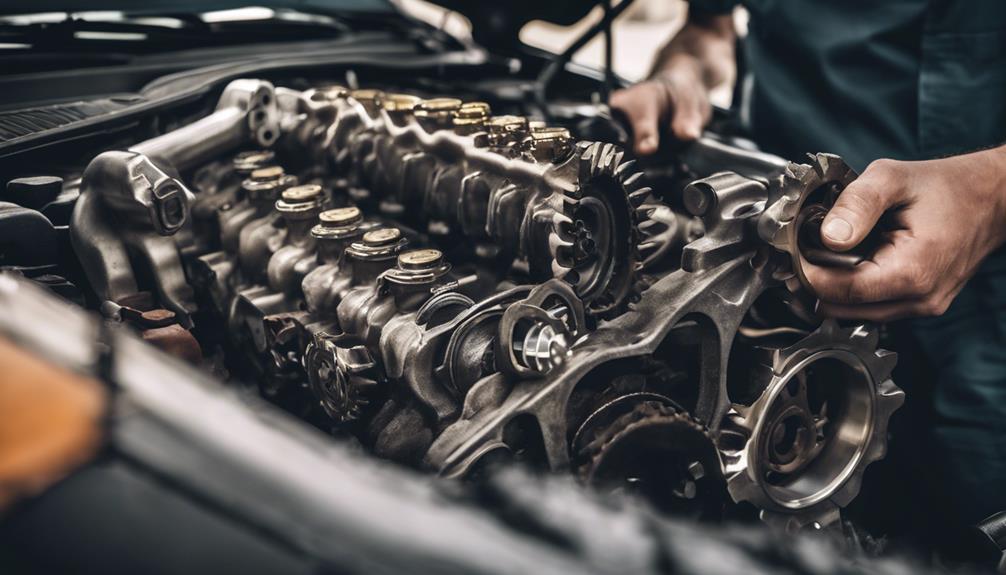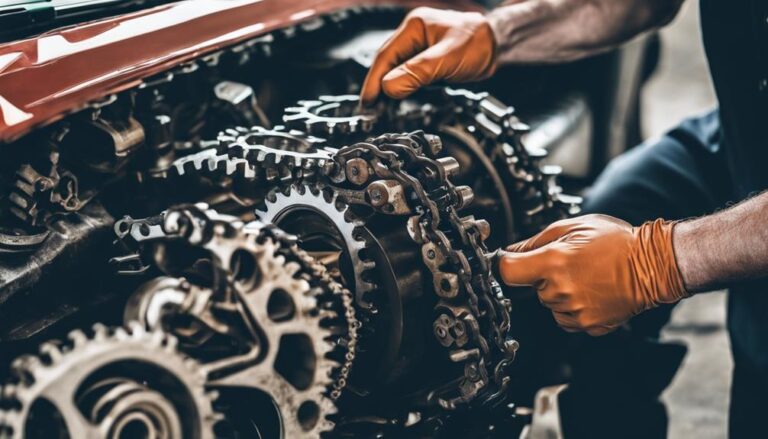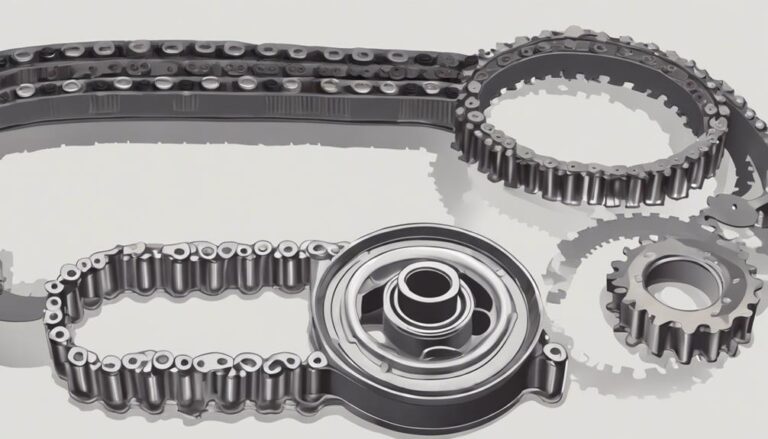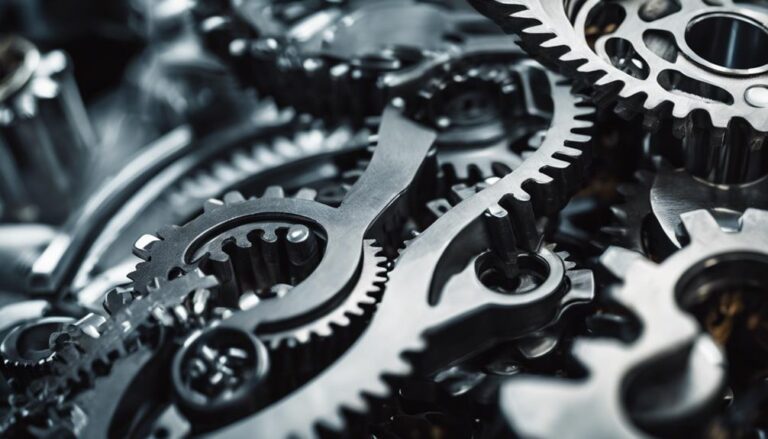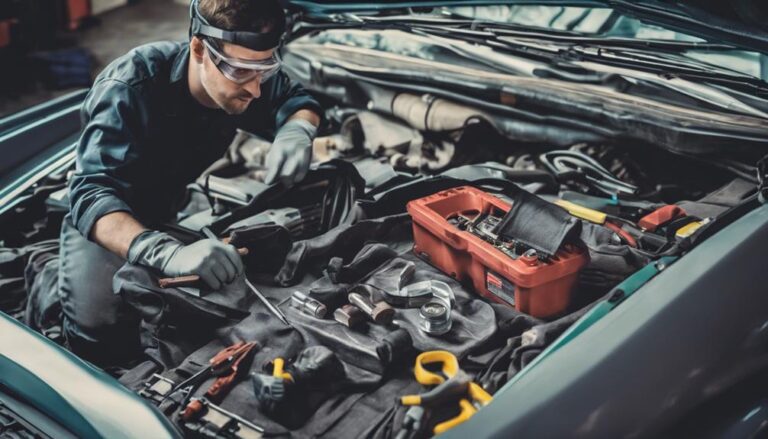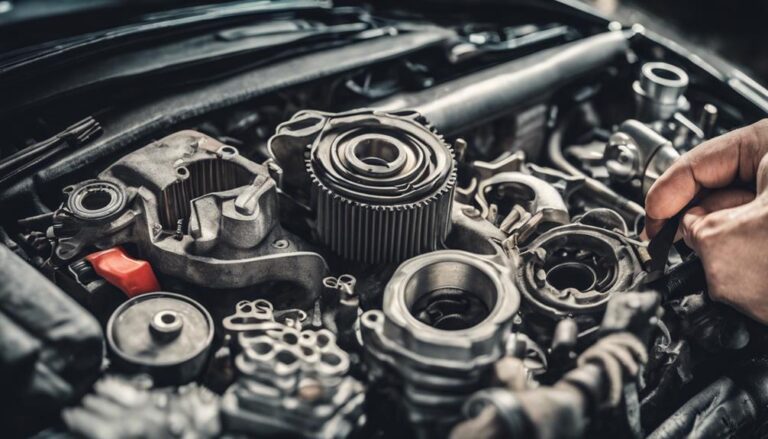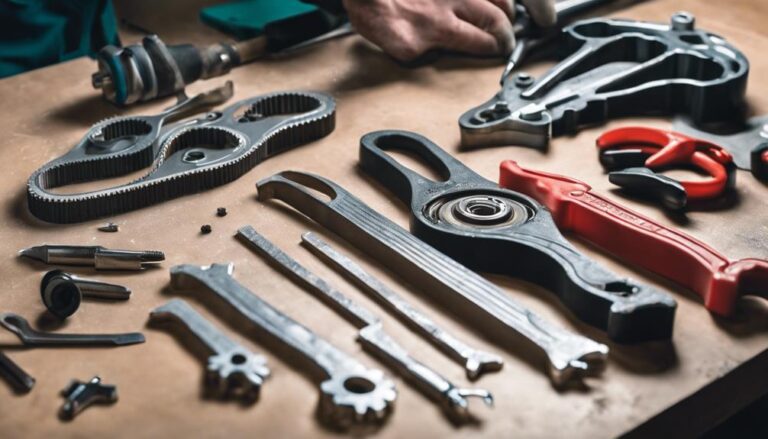7 Best Signs of Timing Chain Failure in Cars
If you've been noticing an unusual array of engine noises lately, your car might be hinting at something more serious – timing chain failure. But that's just the tip of the iceberg.
From engine misfires to metal shavings in oil, these warning signs can't be ignored.
Stay tuned to discover the remaining clues that could save you from a costly repair down the road.
Key Takeaways
- Unusual engine noises like rattling or ticking indicate potential timing chain issues.
- Engine misfires should be addressed promptly to prevent timing chain failure.
- Check engine light illumination signals the need for immediate attention to prevent further damage.
- Metal shavings in the oil are a clear sign of engine wear and potential timing chain problems.
Unusual Engine Noises
If you hear rattling or knocking sounds coming from your car's engine, it could be a sign of potential timing chain failure. Diagnosing methods for these unusual engine noises involve a careful examination of when the sounds occur.
Typically, rattling or knocking noises related to timing chain issues can be heard during engine startup, idling, or acceleration. These sounds indicate a potential problem with the timing chain, often caused by it being loose or stretched.
To prevent such issues, regular preventative maintenance is crucial. Ignoring these noises can lead to severe engine damage if the timing chain fails completely. Therefore, prompt attention to any unusual engine sounds is essential.
Engine Misfires
What are the common indicators of engine misfires that could signal potential timing chain failure in your vehicle? Engine misfires, often a precursor to timing chain issues, manifest through various signs. Spark plug problems, such as carbon buildup or worn-out electrodes, can lead to irregular combustion, causing the engine to misfire. Additionally, fuel delivery issues, like a clogged fuel injector or a faulty fuel pump, can disrupt the air-fuel mixture, resulting in misfires. When experiencing engine misfires linked to timing chain complications, you may notice exhaust smoke, which could indicate incomplete combustion, and a fuel smell due to unburned fuel exiting the exhaust. Addressing these misfires promptly is crucial as they can exacerbate timing chain problems, leading to further engine damage and increased repair costs.
| Indicator | Description | Potential Concern |
|---|---|---|
| Spark Plug Issues | Carbon buildup or worn electrodes | Irregular combustion |
| Fuel Problems | Clogged injector or faulty fuel pump | Disrupted air-fuel mix |
| Exhaust Smoke | Presence of smoke during engine operation | Incomplete combustion |
Metal Shavings in Oil
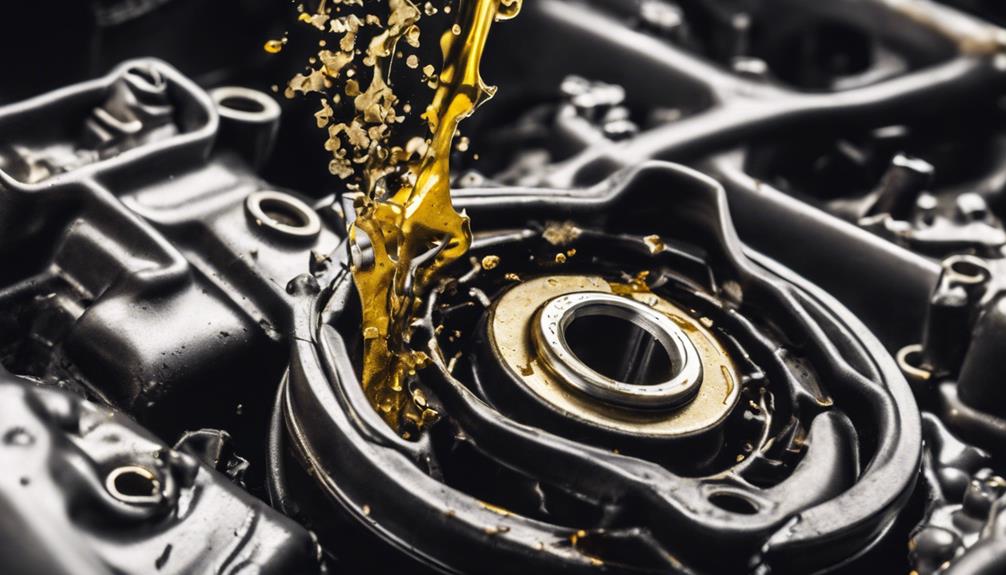
Metal shavings in the oil of your vehicle may serve as a crucial indicator of timing chain wear and potential damage. When conducting engine maintenance, paying attention to the presence of metal particles in the oil is essential for the overall health of your engine. Here are some key points to consider:
- Friction and Abrasion: The presence of metal shavings suggests friction and abrasion within the engine, indicating potential issues with the timing chain.
- Engine Wear: Metal shavings can lead to increased engine wear, affecting performance and efficiency over time.
- Preventive Measures: Detecting metal shavings early through oil analysis can help prevent further damage to engine components.
- Maintenance Benefits: Regularly checking for metal shavings during oil changes is crucial for maintaining engine health and longevity.
- Performance Optimization: Addressing metal shavings promptly can optimize engine performance and prevent costly repairs down the line.
Engine Won't Start
If your engine won't start and you don't hear a cranking sound, it could indicate a timing chain failure. Additionally, pay attention to the check engine light, as it might illuminate due to issues with the timing chain.
These symptoms are crucial indicators that your timing chain may need immediate attention to prevent further damage.
No Cranking Sound
Experiencing a lack of cranking sound when starting your car may indicate potential timing chain failure. When this occurs, it's essential to address the issue promptly to prevent further damage. Here are some key points to consider:
- Check the battery and electrical connections for any faults or loose connections.
- Inspect the starter motor and solenoid for proper functioning.
- Evaluate the ignition switch and wiring for any signs of wear or damage.
- Test the crankshaft position sensor to ensure it's operating correctly.
- Consider performing a diagnostic scan to identify any potential issues within the starting system.
Addressing these aspects can help troubleshoot the no cranking sound and determine if timing chain failure is the underlying cause.
Check Engine Light
Upon illumination of the check engine light with the engine failing to start, immediate attention to potential timing chain issues is crucial to prevent further complications.
The check engine light serves as a warning sign of possible timing chain failure, disrupting engine timing. This issue can result in the engine not starting, leading to inconvenience and potential repair expenses.
Diagnostic tools can help pinpoint the exact problem by identifying misaligned camshaft and crankshaft positions caused by timing chain issues. Ignoring this warning and attempting to start the engine can exacerbate the damage, increasing repair costs.
To address this issue efficiently, seeking a professional mechanic for a thorough timing chain inspection is advisable. Take action promptly to avoid extensive damage and costly repairs.
Check Engine Light On
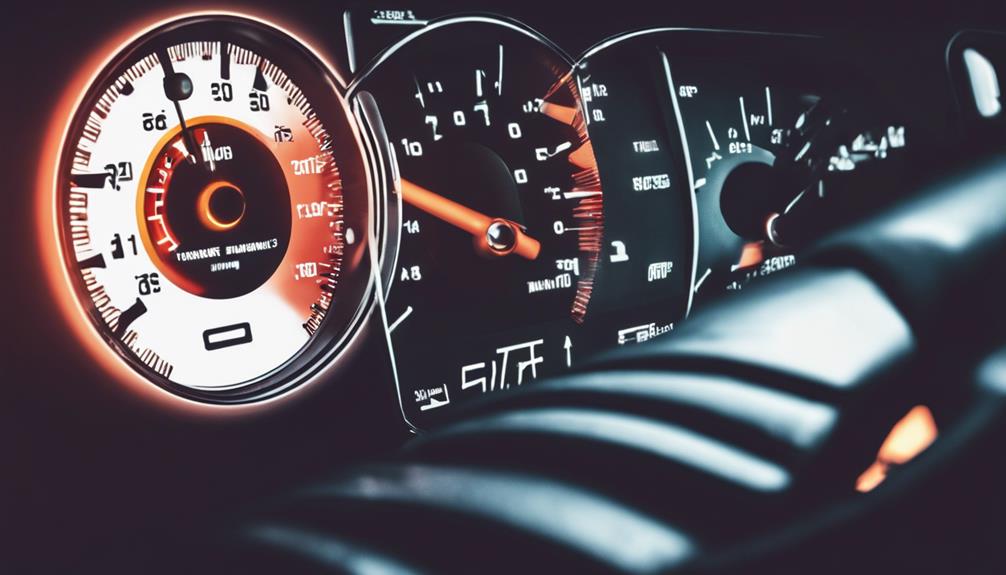
The illumination of the check engine light in your car could indicate potential timing chain issues, a crucial aspect of the engine's timing system. When the check engine light comes on, it's essential to address the underlying problem promptly to prevent further damage.
Here are some key points to consider:
- Modern cars use sensors to detect abnormalities related to timing chain function, triggering the check engine light.
- Ignoring a check engine light related to timing chain can lead to severe engine damage or failure.
- Diagnostic tools can pinpoint the exact timing chain issue causing the check engine light to come on.
- Promptly addressing a check engine light related to timing chain can prevent costly repairs and engine complications.
- Seek professional help to diagnose and repair any timing chain issues indicated by the check engine light to ensure the longevity of your engine.
Don't delay in addressing the check engine light to keep your engine running smoothly.
Loss of Power
If your vehicle is exhibiting a noticeable decrease in power output, it could be a strong indicator of potential timing chain failure affecting the engine's performance. Power loss causes are often linked to timing chain issues that disrupt the synchronization of critical engine components. When the timing chain stretches, skips teeth, or fails entirely, the engine's timing events can be thrown off, leading to a significant impact on performance. This can manifest as reduced power during acceleration, slower response to throttle inputs, and overall sluggishness in operation. Additionally, a failing timing chain may cause engine misfires and rough running, further contributing to the loss of power.
Understanding the performance impact of timing chain failure is crucial. Addressing these issues promptly is essential to prevent further engine damage and restore optimal power output. By recognizing the signs of decreased power as a potential indicator of timing chain problems, you can take proactive steps to diagnose and rectify the issue, ensuring your vehicle operates at its best.
Engine Overheating
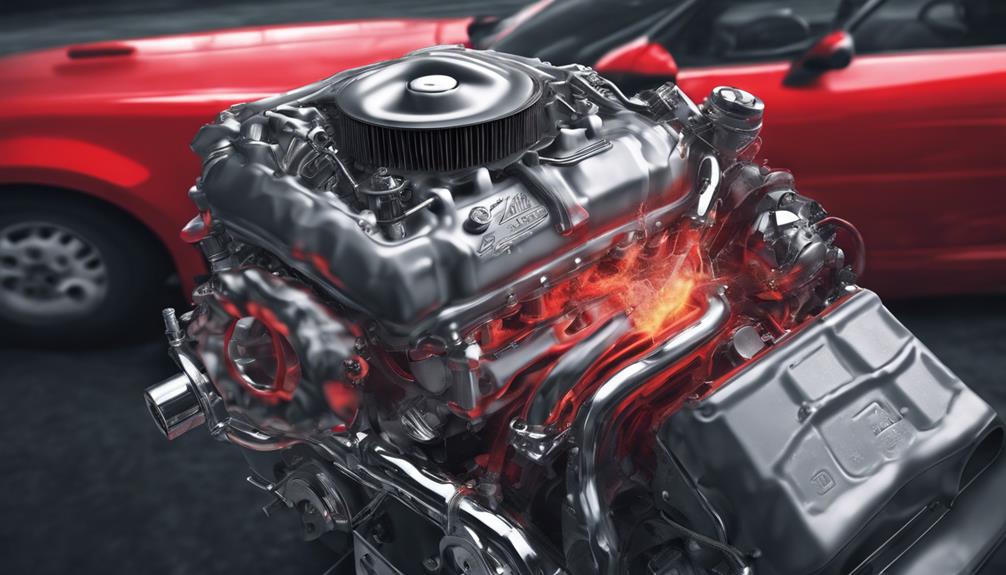
When the timing chain fails in your car, the engine components may become misaligned, leading to issues like poor coolant circulation. This can result in your engine overheating, which may manifest in temperature gauge spikes, coolant loss problems, and steam coming from the hood.
Monitoring these signs closely can help you address timing chain problems promptly and prevent further damage to your engine.
Temperature Gauge Spikes
Monitoring your vehicle's temperature gauge for sudden spikes is crucial for detecting potential timing chain issues related to engine overheating. Here are some key points to consider:
- Sudden temperature gauge spikes can indicate engine overheating, potentially caused by timing chain problems.
- Timing chain issues can lead to improper synchronization of engine components, resulting in overheating.
- Regularly checking for temperature fluctuations during normal driving can help catch timing chain issues early.
- Ignoring overheating due to timing chain failure may result in severe engine damage if not promptly addressed.
- Prompt inspection of the timing chain when experiencing temperature gauge spikes can prevent costly repairs and engine failure.
Coolant Loss Issues
To prevent potential timing chain damage due to engine overheating, addressing coolant loss issues promptly is imperative. Coolant leaks can lead to a drop in fluid levels essential for regulating engine temperature, potentially causing the engine to overheat.
Engine maintenance is crucial in ensuring the cooling system functions optimally to prevent coolant loss. Regularly checking for any signs of leaks, such as puddles under the vehicle or low coolant levels in the reservoir, is key to addressing coolant loss issues promptly.
Neglecting coolant leaks can result in overheating, accelerating timing chain wear, and increasing the risk of chain failure. Proper maintenance and timely intervention in case of coolant loss are vital in preserving the integrity of both the cooling system and the timing chain.
Steam From Hood
Steam billowing from the hood signals a critical indicator of potential engine overheating, often linked to malfunctioning timing chain issues. When you detect steam emanating from your vehicle's hood, it's crucial to address the situation promptly to prevent further damage. Here are some key points to consider:
- Immediate Action: Pull over safely and turn off the engine to prevent overheating.
- Cooling System Inspection: Check coolant levels and look for any leaks in the system.
- Professional Assessment: Have a mechanic inspect the timing chain for potential failure.
- Preventive Measures: Regularly monitor the temperature gauge to catch issues early.
- Timely Repairs: Addressing steam from the hood promptly can avoid costly repairs down the line.
Frequently Asked Questions
What Are the Symptoms of a Worn Out Timing Chain?
If a worn timing chain plagues your engine, you'll notice poor performance and erratic idling. Warning lights may signal trouble. Seek immediate attention to prevent further damage. Address these symptoms promptly for optimal performance and longevity.
What Kind of Noise Does a Bad Timing Chain Make?
When your timing chain is faulty, you'll hear a distinct rattling or slapping noise from your engine. It's a clear sign of trouble. Make sure to address this issue promptly to avoid more significant damage.
Will a Car Still Run With a Bad Timing Chain?
Yes, your car may still run with a bad timing chain, but engine damage can occur. This affects performance, leading to misfires and rough idling. Ignoring it can be costly. Consider maintenance to prevent more significant issues with engine timing and valve operation.
How Long Can I Drive With a Bad Timing Chain?
You should address a bad timing chain promptly for driving safety and engine longevity. Continuing to drive with this issue can lead to sudden engine failures. Timely maintenance is crucial to avoid costly repairs and ensure performance.
Conclusion
In conclusion, timing chain failure in cars can be a serious issue that requires immediate attention. By being aware of the signs such as unusual engine noises, engine misfires, and metal shavings in oil, you can prevent potential engine damage and costly repairs.
Remember, proper maintenance and prompt detection are key to ensuring the longevity of your vehicle. Stay vigilant and address any warning signs promptly to keep your engine running smoothly.

